Austin, Oakland, St. Petersburg (FL), San Francisco, Chula Vista, Detroit, New Orleans, Denver, Jacksonville, Naples, Tampa, Mesa, Portland, Seattle.
By Wolf Richter for WOLF STREET.
Condos are often the first and biggest movers in local housing markets. Prices exploded in many of them over the three years between mid-2019 and the peak in mid-2022, by 60% such as in Austin, TX; by 70% such as in Tampa, FL, and Chula Vista, San Diego County, CA; or by 80% such as in Mesa, AZ, and Lakeland, FL.
But this absurdity is now coming unglued, and prices have begun spiraling down. In Austin, which is on the forefront of this movement, prices have already given up nearly two-thirds of the 60% three-year gain. People who bought at the top in mid-2022 are 22% underwater. People who bought in mid-2019 are still sitting on a 20% gain that is shrinking.
Price drops from peak (charts below):
- Austin, TX: -22%
- Oakland, CA: -20%
- Saint Petersburg, FL: -17%
- Chula Vista, CA: -14%
- San Francisco, CA: -14%
- Detroit, MI: -13%
- New Orleans, LA: -12%
- Lakeland, FL: -13%
- Denver, CO: -11%
- Jacksonville, FL: -11%
- Naples, FL: -11%
- Tampa, FL: -10%
- Mesa, AZ: -10%
- Portland, OR: -10%
- Seattle, WA: -10%
In Florida, price drops are accelerating. Of the 15 cities here where condo prices through March have fallen by 10%-plus from their peaks, 5 are in Florida, but not yet including Miami and some other cities in the state with declines of still less than 10%. In the little tables for each city below, note the sharp month-to-month drops in those cities in Florida – a sign that the declines are heating up.
Condo dynamics are different.
Condos attract a large share of investors, including mom-and-pop investors, that want to generate income from long-term rentals, student rentals, or vacation rentals. And they want to cash in later on the expected huge capital gains. Condos also attract second-home buyers, especially along the coasts and in the mountains. In the southern part of the US, they also attract snowbirds, often retirees, from parts of the US and Canada with long and harsh winters.
But long-term rentals have come under pressure from the massive supply of brand-new apartment developments that sprang up over the past few years. The vacation-rental boom over the past few years created a huge supply of vacation rentals, and demand for them may have peaked. And snowbirds from Canada anecdotally are said to be getting second thoughts about their condos in Florida, Texas, and Arizona.
Then there are the issues of soaring HOA feeds in some areas, driven by soaring insurance costs.
Older condo buildings can whack owners over the head with huge special assessments to fund long-neglected repair and maintenance projects. For investors, that’s a tough nut to crack: Instead of getting regular cashflow from the unit, they’ve got to plow more money into it. Owners that don’t want to or can’t pay for those assessments would have to sell their units.
Interest rates have risen and stayed high, making purchases much more expensive after the 60%, 70%, or 80% three-year price spikes in the erstwhile hottest markets.
In addition, news of a growing “mortgage blacklist” at Fannie Mae began circulating. It has grown to over 5,000 condo properties that failed to meet Fannie Mae’s lending criteria. Over 1,400 of these properties are in Florida and over 700 are in California, the two states most impacted by it. Obviously, the numbers of properties on the blacklist are only a minuscule portion of the total number of condo properties. But condos in one of the blacklisted properties are difficult to finance, and therefore are difficult to sell other than to cash buyers, often at a big discount. In the broader sense, there may be more of a psychological impact from that blacklist, including the fear that an older not-blacklisted property might end up on the blacklist in the future.
In some densely populated cities, such as San Francisco, condos make up a bigger part of the housing market than single-family residences.
The absurd price spikes come unglued.
So here are the 15 bigger cities where condo prices have dropped by 10% or more from their respective peaks. Most of those peaks were in mid-2022, but some peaks were in prior years.
Condo prices here are seasonally adjusted three-month average prices of “mid-tier” condos. The data are from the Zillow Home Value Index (ZHVI), which is based on millions of data points in Zillow’s “Database of All Homes,” including from public records (tax data), MLS, brokerages, local Realtor Associations, real-estate agents, and households across the US. It includes pricing data for off-market deals and for-sale-by-owner deals.
Blame for this absurdity in 2020 through mid-2022 goes to the Fed’s schemes of money-printing and interest rate repression at the time, which triggered a general mania for asset purchases. But those schemes stopped in 2022, and then were reversed to some extent, including by un-printing $2.24 trillion so far and by much higher short-term policy rates, the combination of which caused mortgage rates to surpass 6% since September 2022, and lingering on either side of 7% much of the time, including now even after the Fed has cut short-term policy rates by 1 full percentage point (here is my explanation why mortgage rates have remained high).
The left figure in the little tables below shows the drop from the peak. The right figure shows the still huge gains since 2000.
Cities in Texas, and Denver, didn’t really have much of a Housing Bubble 1, and therefore didn’t have much of a Housing Bust 1. But they made up for it during Housing Bubble 2.
| Austin, City, Condo Prices | |||
| From Jul 2022 peak | MoM | YoY | Since 2000 |
| -22% | -0.3% | -5.7% | 121% |
Lowest since April 2021.
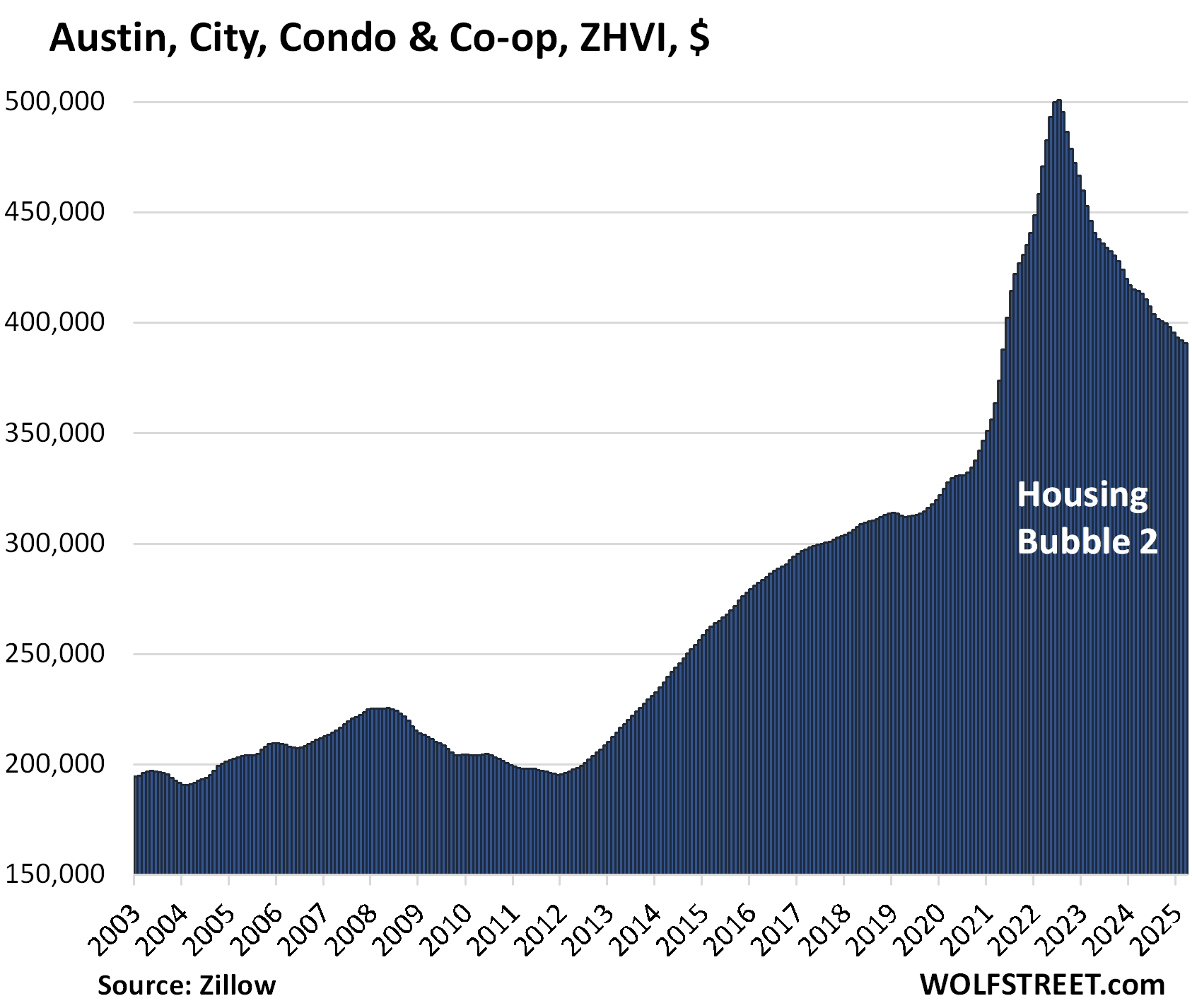
| Oakland, City, Condo Home Prices | |||
| From May 2022 peak | MoM | YoY | Since 2000 |
| -20% | -1.0% | -7.2% | 179% |
Lowest since September 2016.
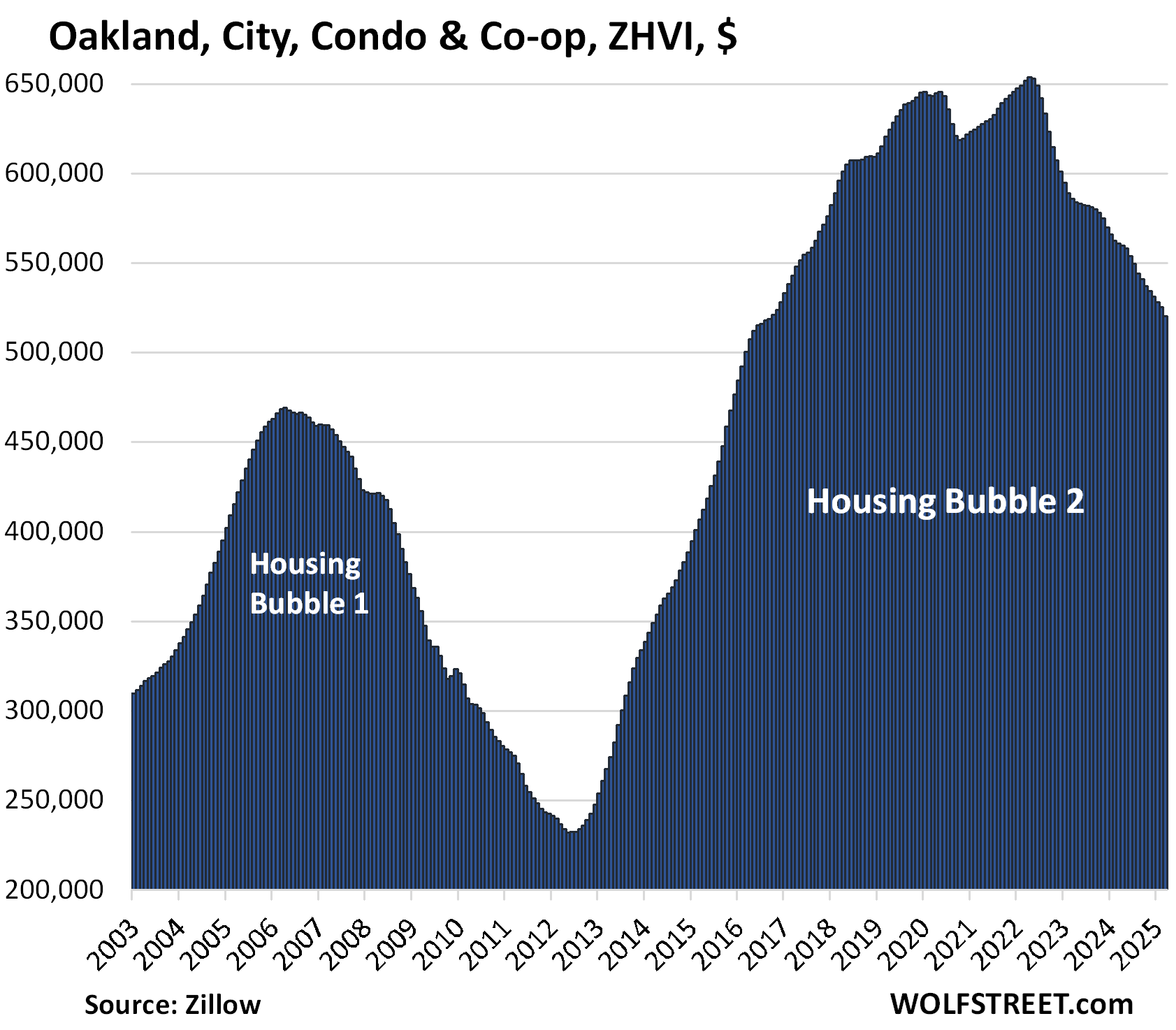
| Saint Petersburg, Fl, City, Condo Prices | |||
| From Oct 2022 peak | MoM | YoY | Since 2000 |
| -17% | -1.1% | -12% | 226% |
Lowest since January 2022.
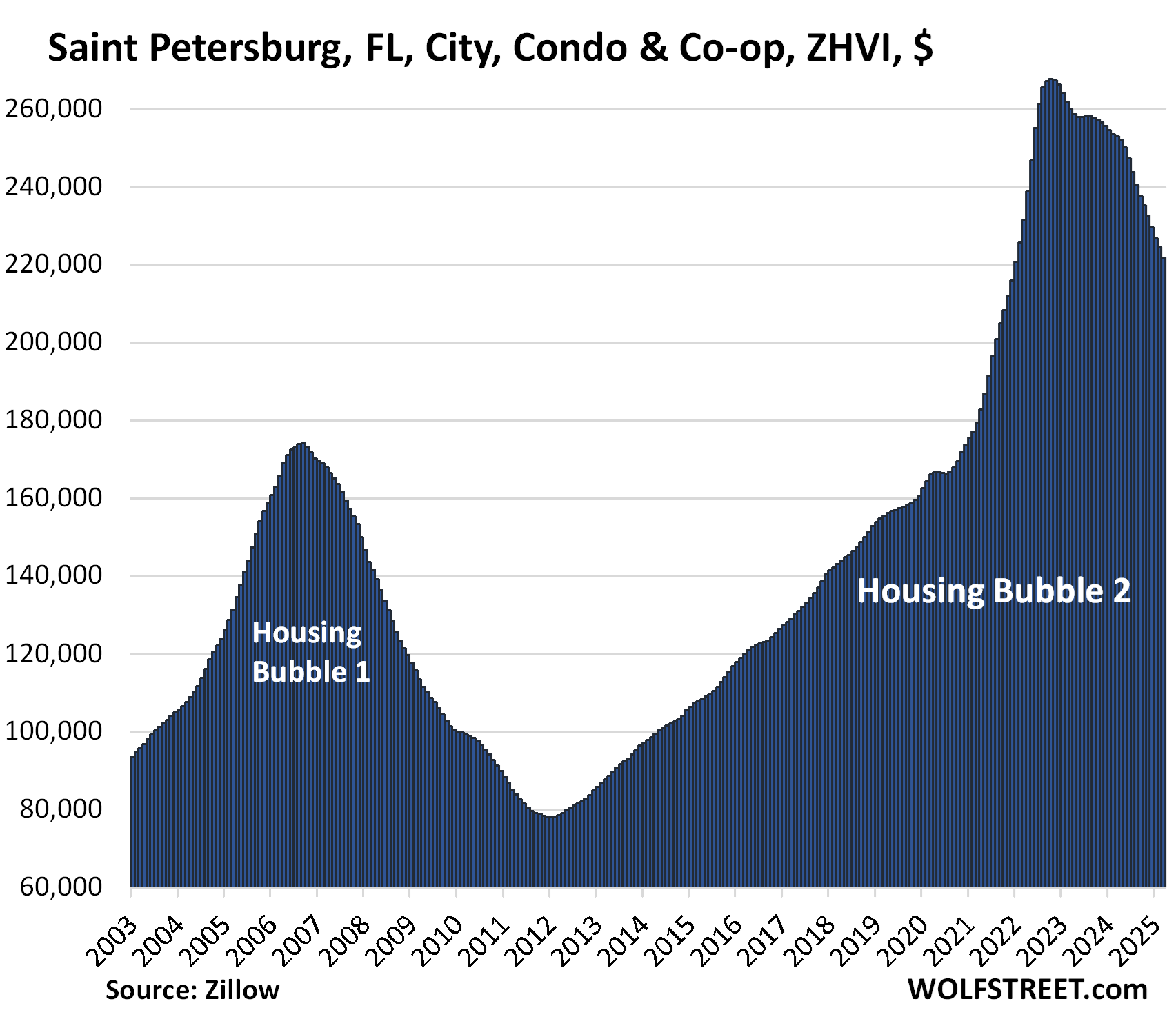
| Chula Vista, CA, City, Condo Prices | |||
| From Jun 2022 peak | MoM | YoY | Since 2000 |
| -14% | 0% | 0% | 222% |
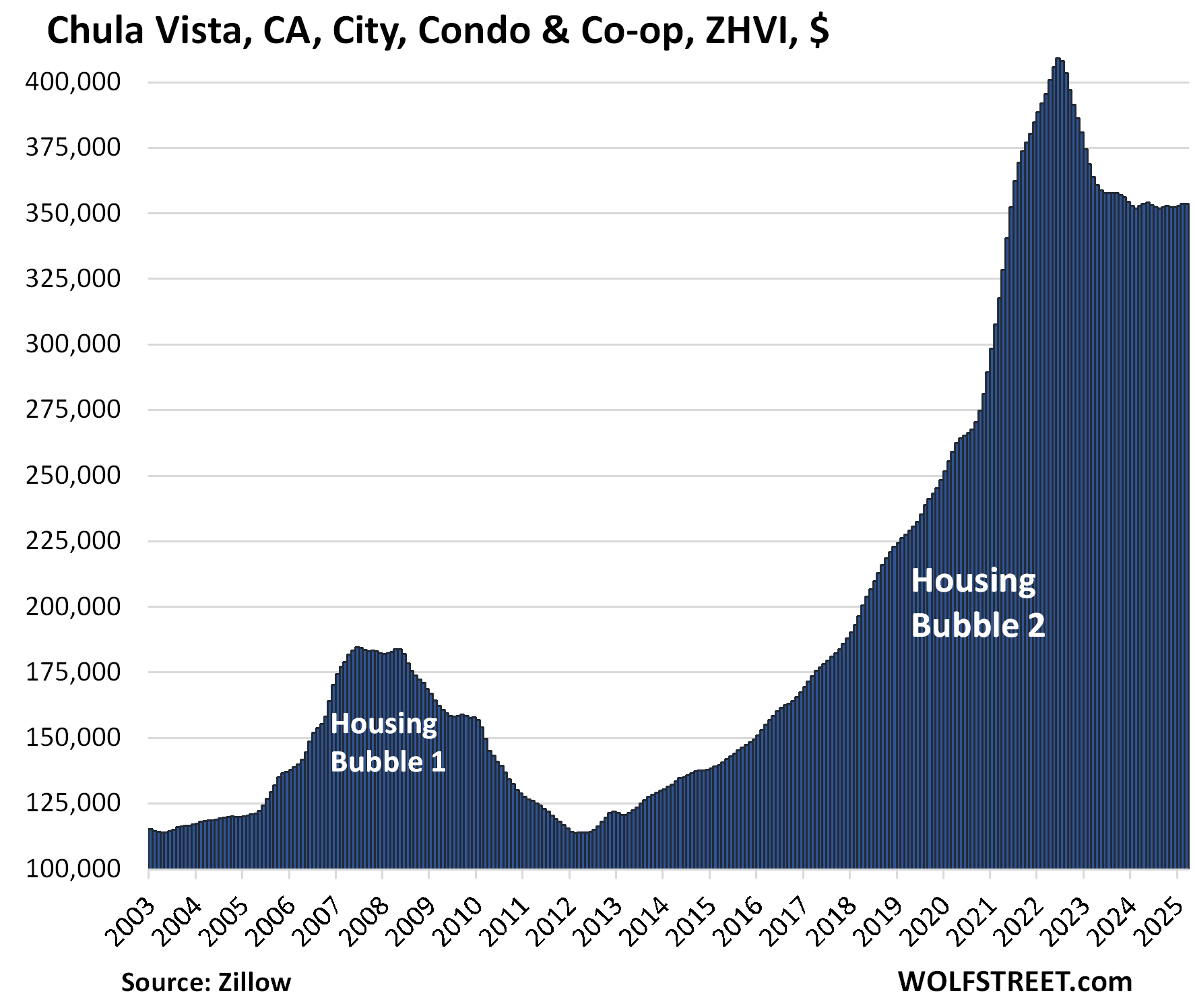
| San Francisco, City, Condo Prices | |||
| From May 2022 peak | MoM | YoY | Since 2000 |
| -14% | -0.1% | 0.5% | 145% |
Back to May 2015.
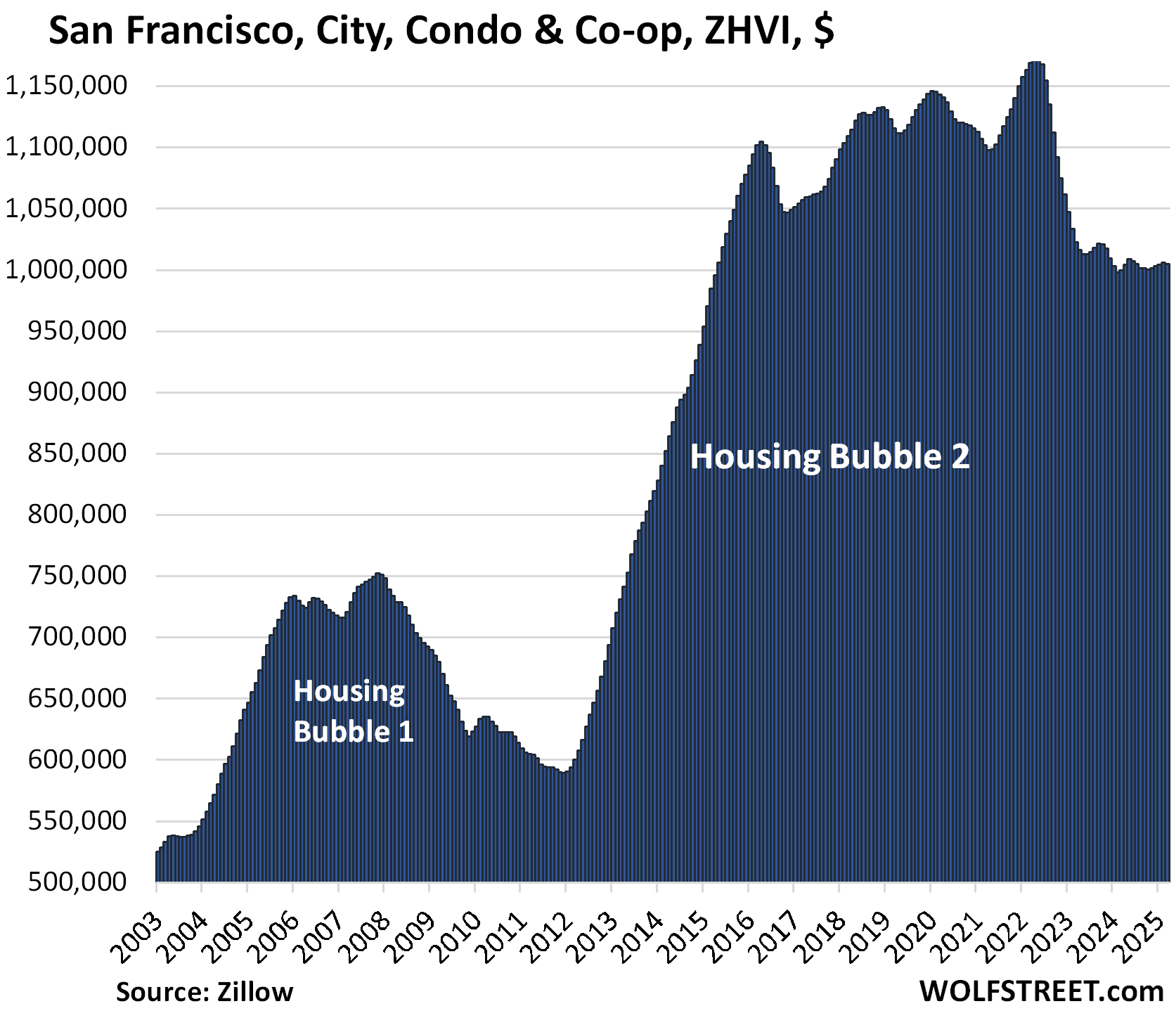
| Detroit, City, Condo Prices | |||
| From Sep 2021 peak | MoM | YoY | Since 2000 |
| -13% | 0.2% | -4.3% | 271% |
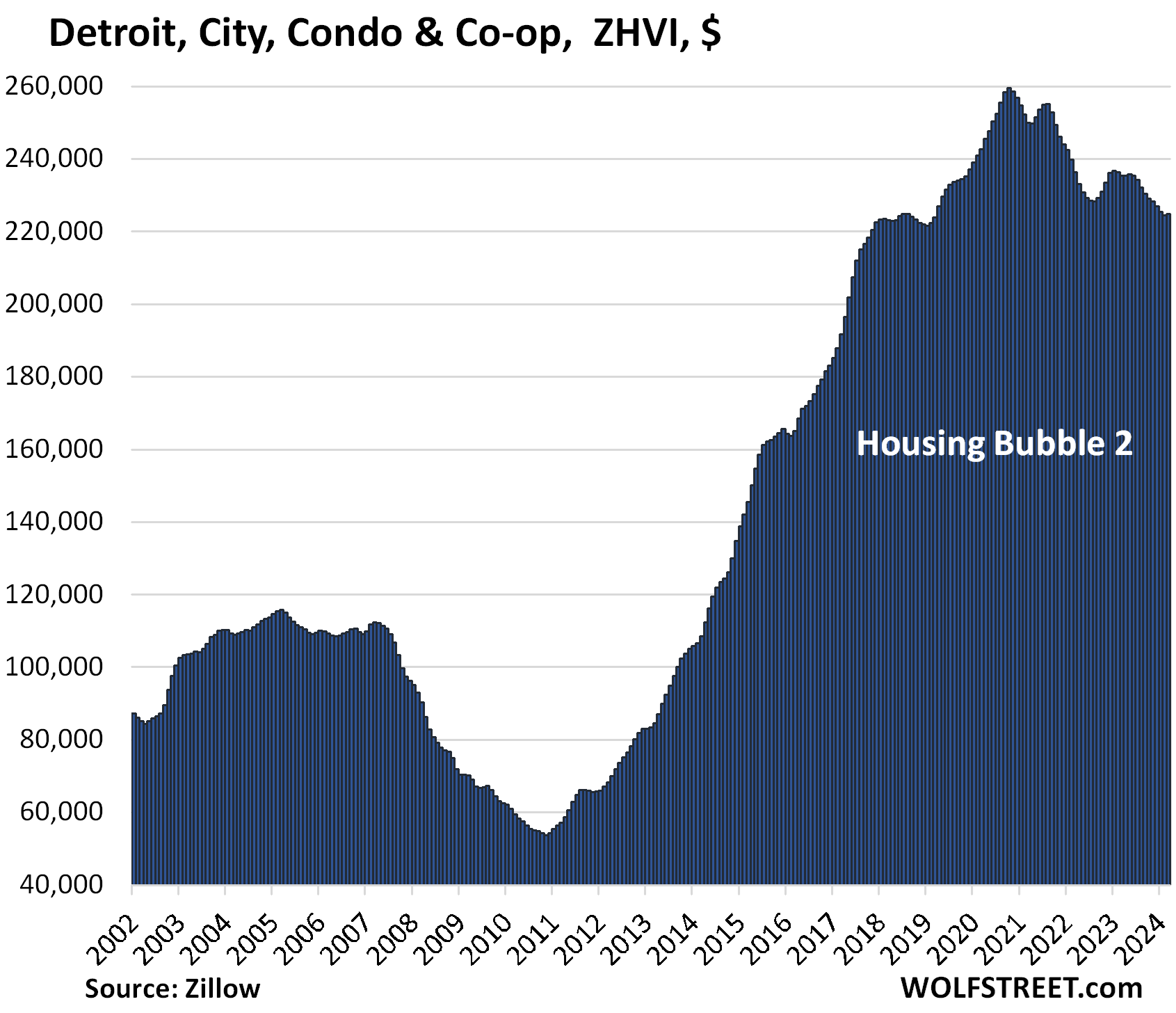
| New Orleans, City, Condo Prices | |||
| From Jun 2022 peak | MoM | YoY | Since 2000 |
| -12% | -0.4% | -4.1% | 102% |
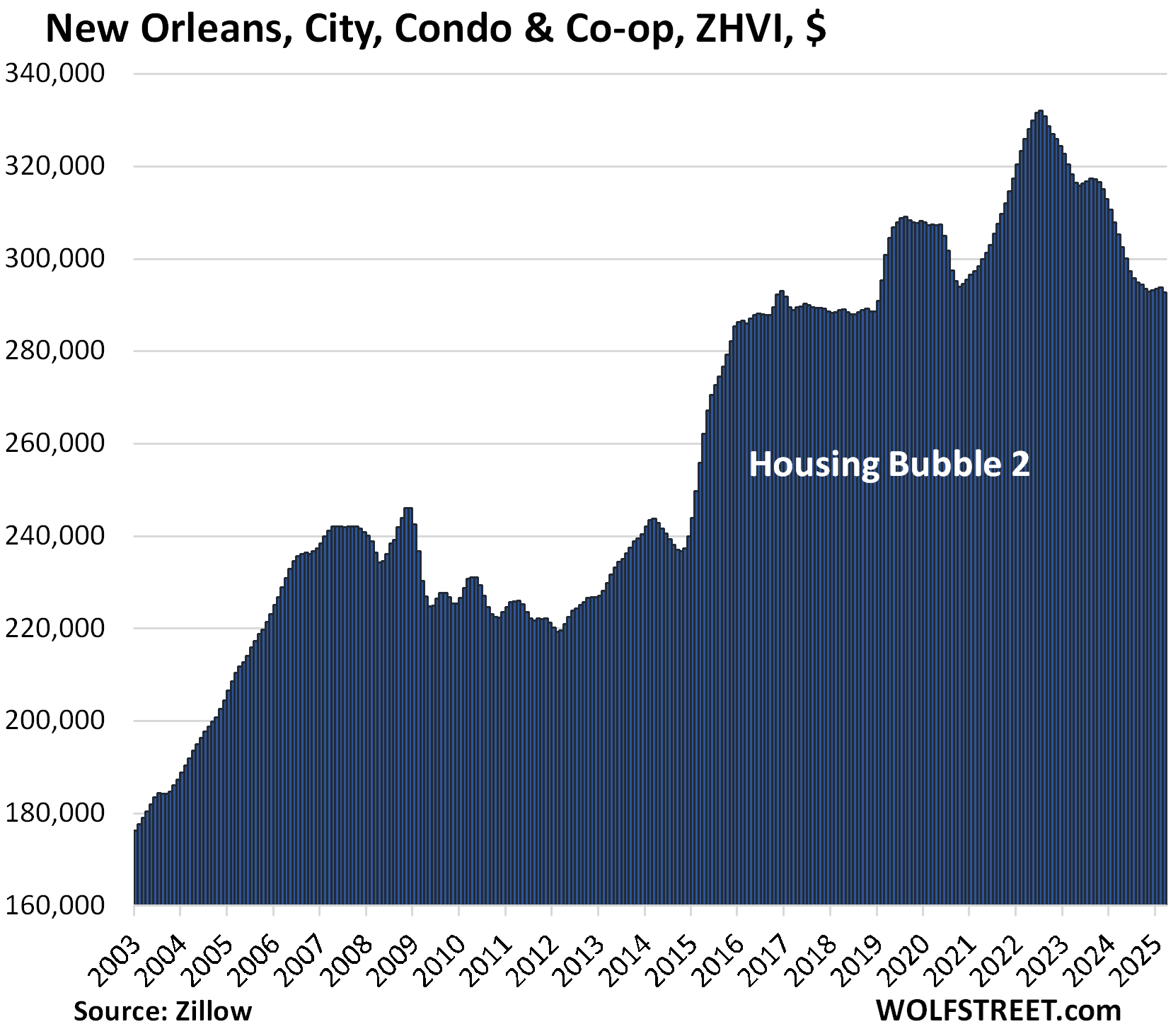
| Lakeland, FL, City, Condo Prices | |||
| From July 2022 peak | MoM | YoY | Since 2000 |
| -13% | -1.3% | -11% | 161% |
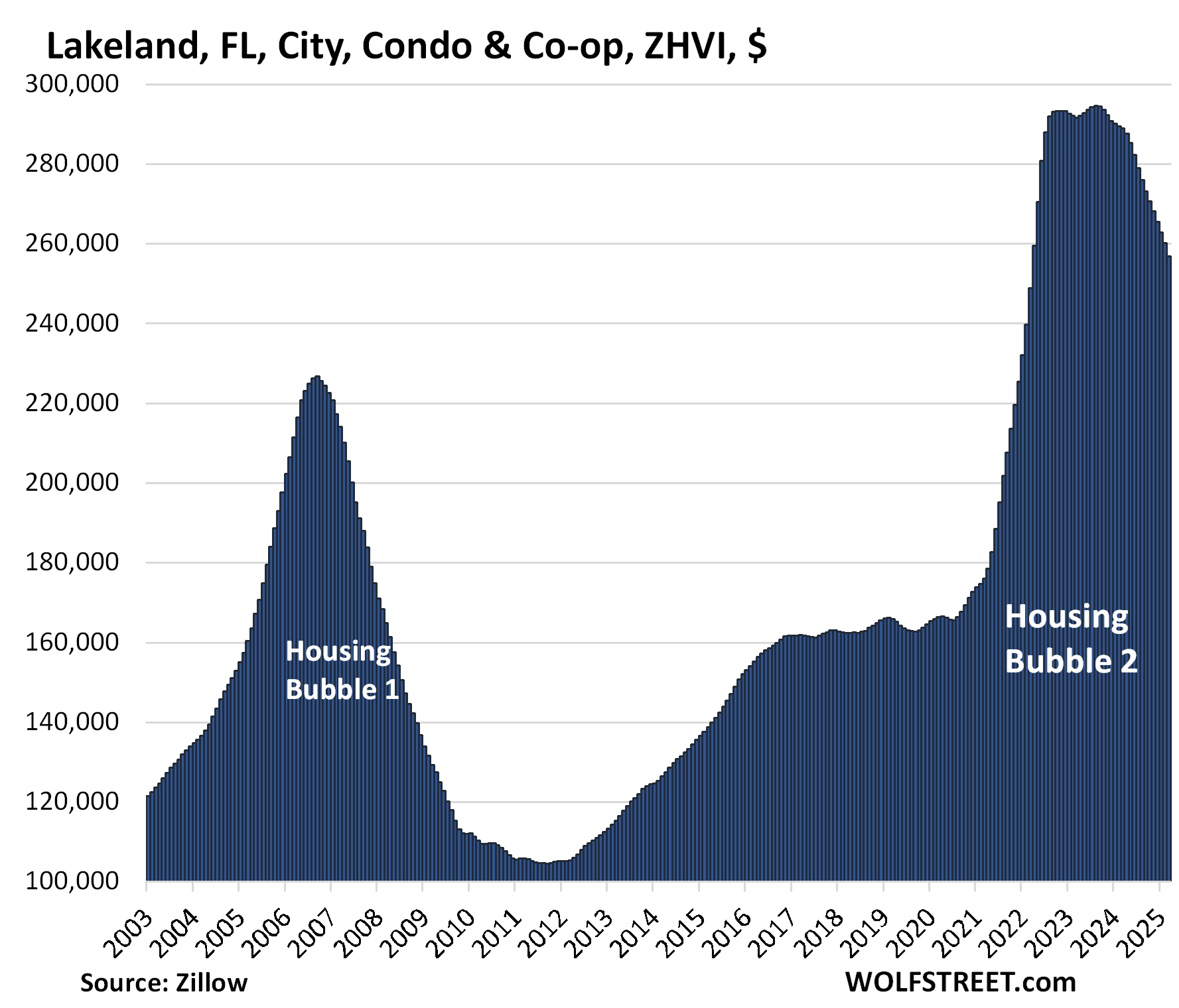
| Denver, City, Condo Prices | |||
| From Jul 2022 peak | MoM | YoY | Since 2000 |
| -11% | -0.9% | -5.7% | 148% |
Lowest since September 2021.
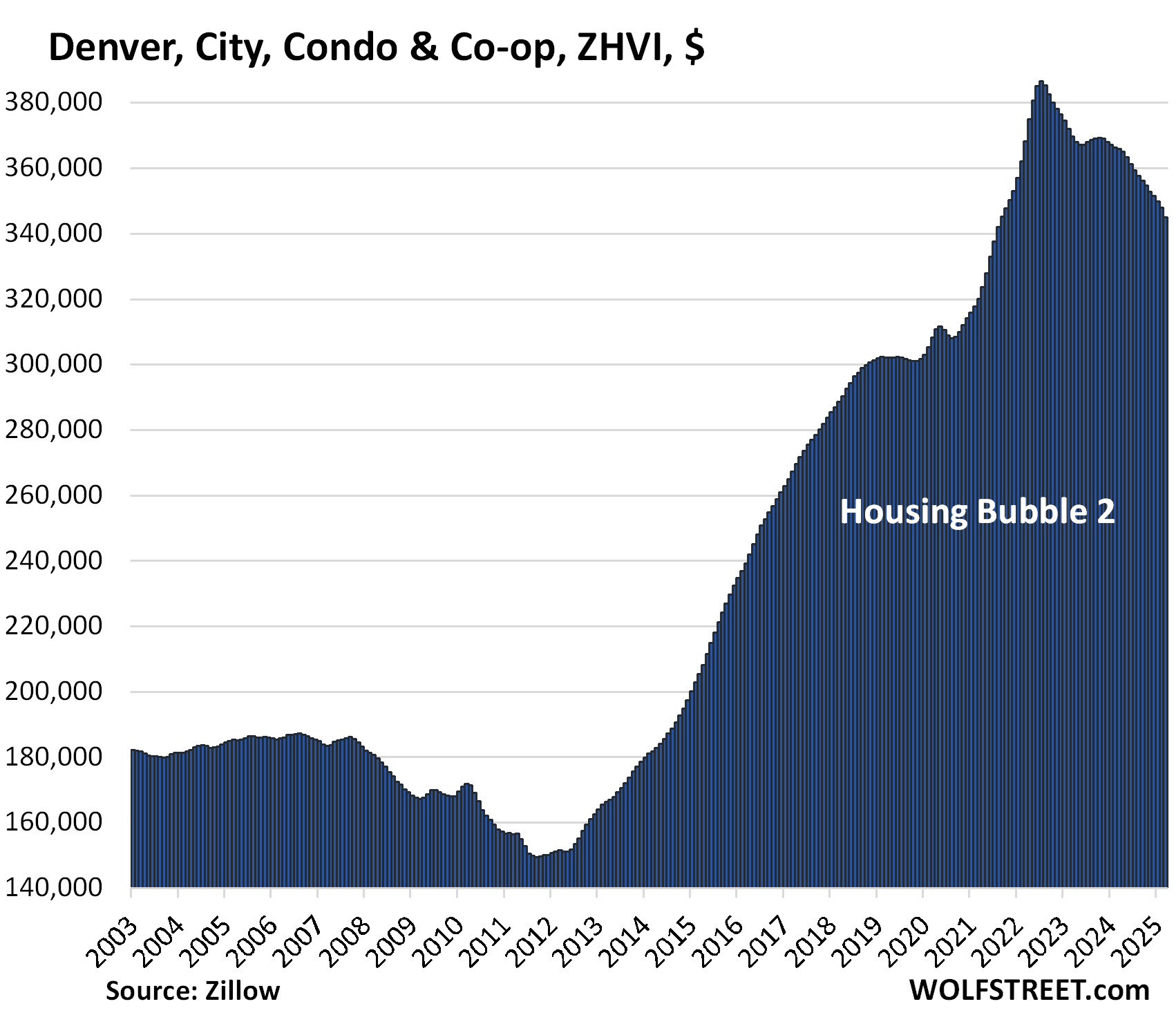
| Jacksonville, FL, City, Condo Prices | |||
| From Nov 2022 peak | MoM | YoY | Since 2000 |
| -11% | -1.1% | -8.6% | 171% |
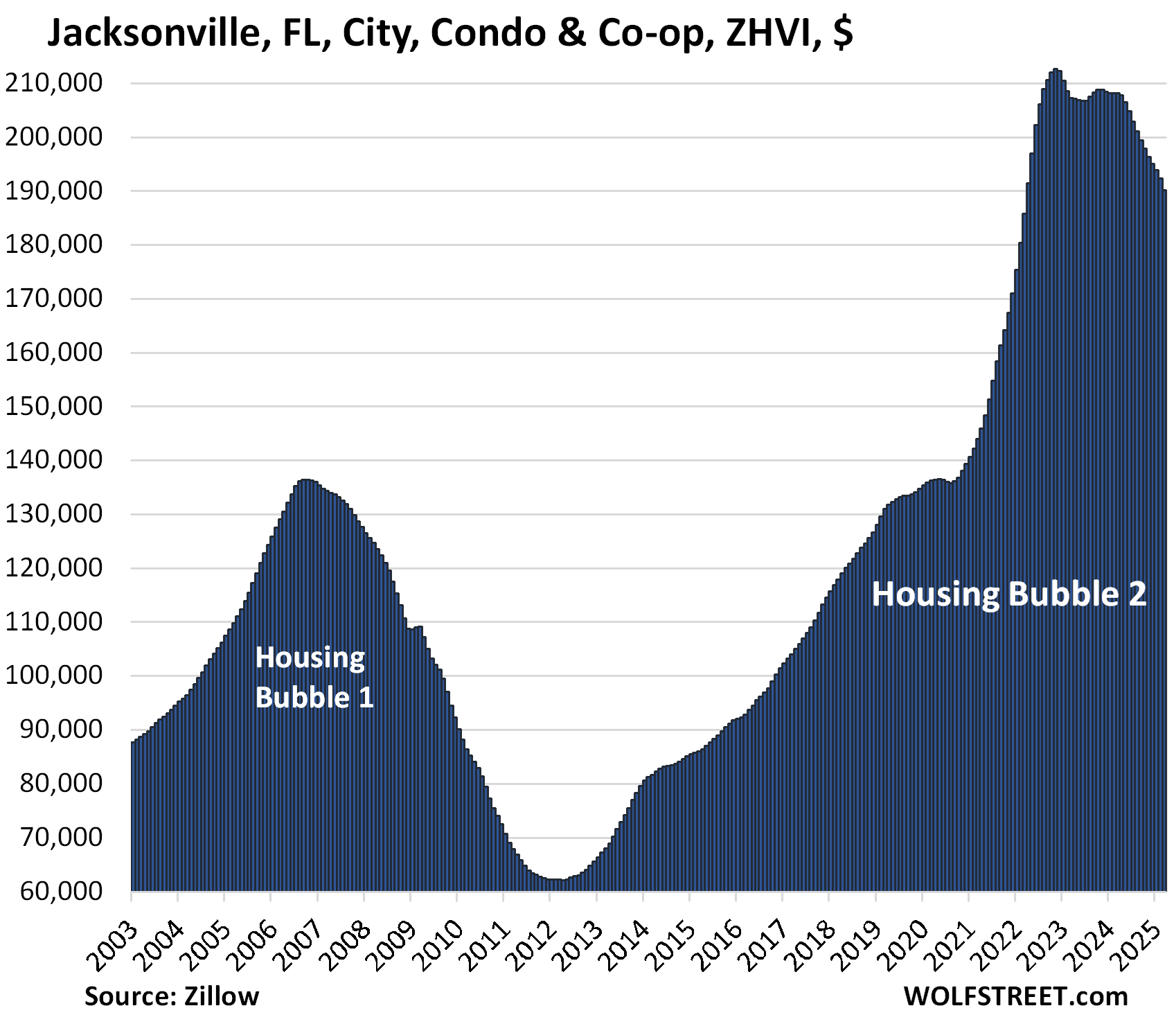
| Naples, FL, City, Condo Prices | |||
| From Aug 2022 peak | MoM | YoY | Since 2000 |
| -11% | -0.7% | -9% | 175% |
This would kind of funny, if it weren’t so serious:
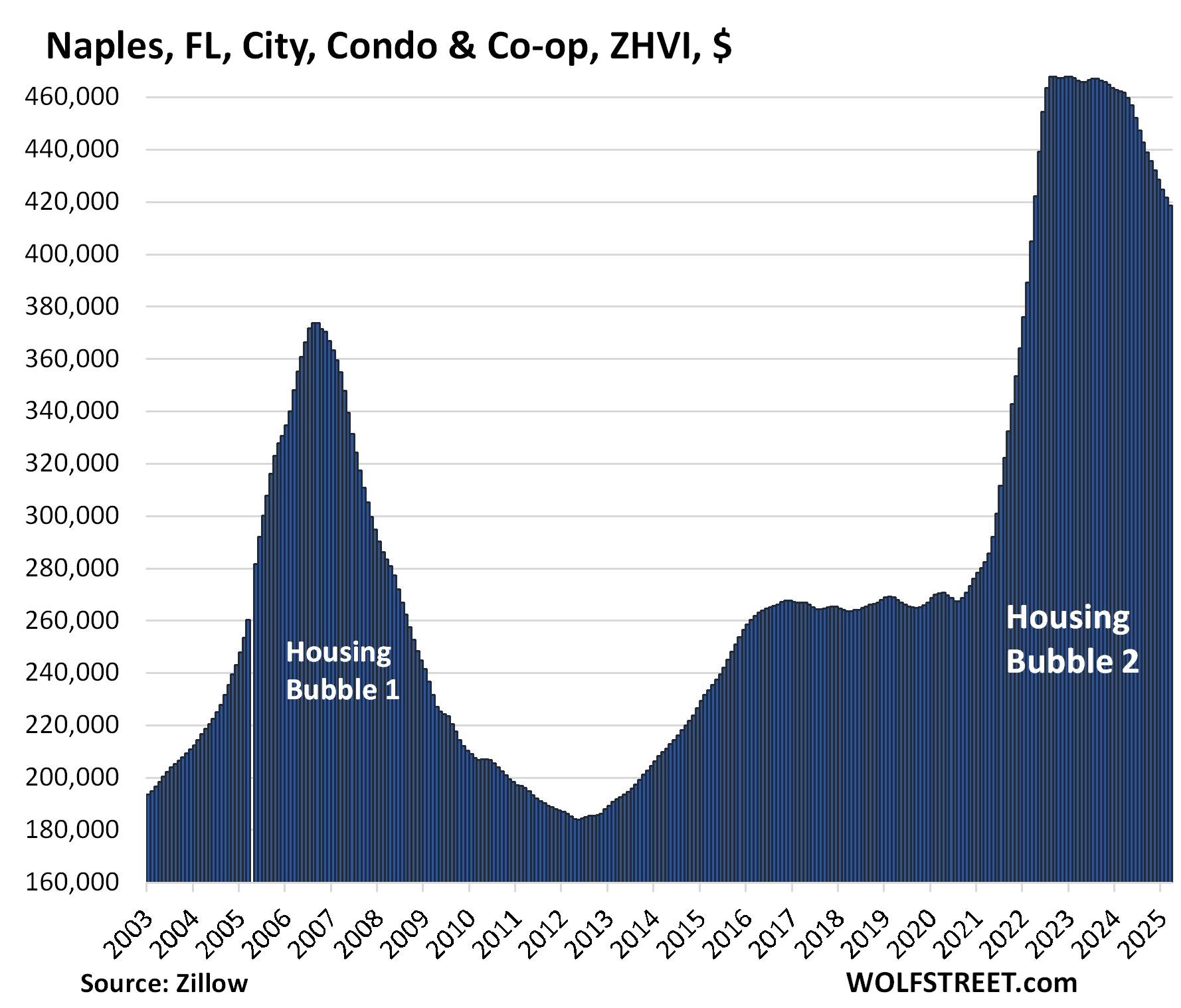
| Tampa, City, Condo Prices | |||
| From Sep 2022 peak | MoM | YoY | Since 2000 |
| -10% | -0.7% | -7.5% | 293% |
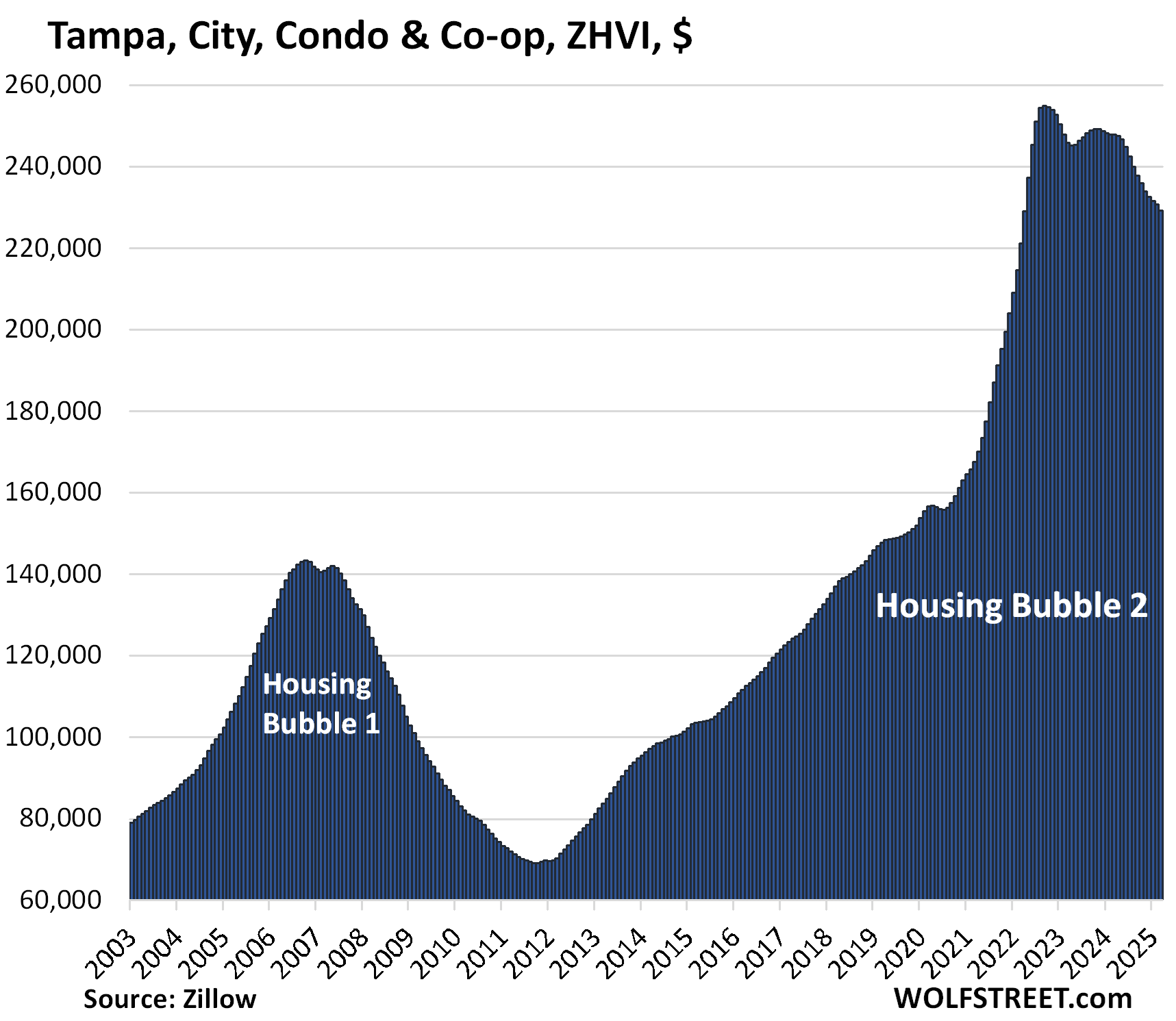
| Mesa, AZ, City, Condo Prices | |||
| From Aug 2022 peak | MoM | YoY | Since 2000 |
| -10% | -0.5% | -4.1% | 215% |
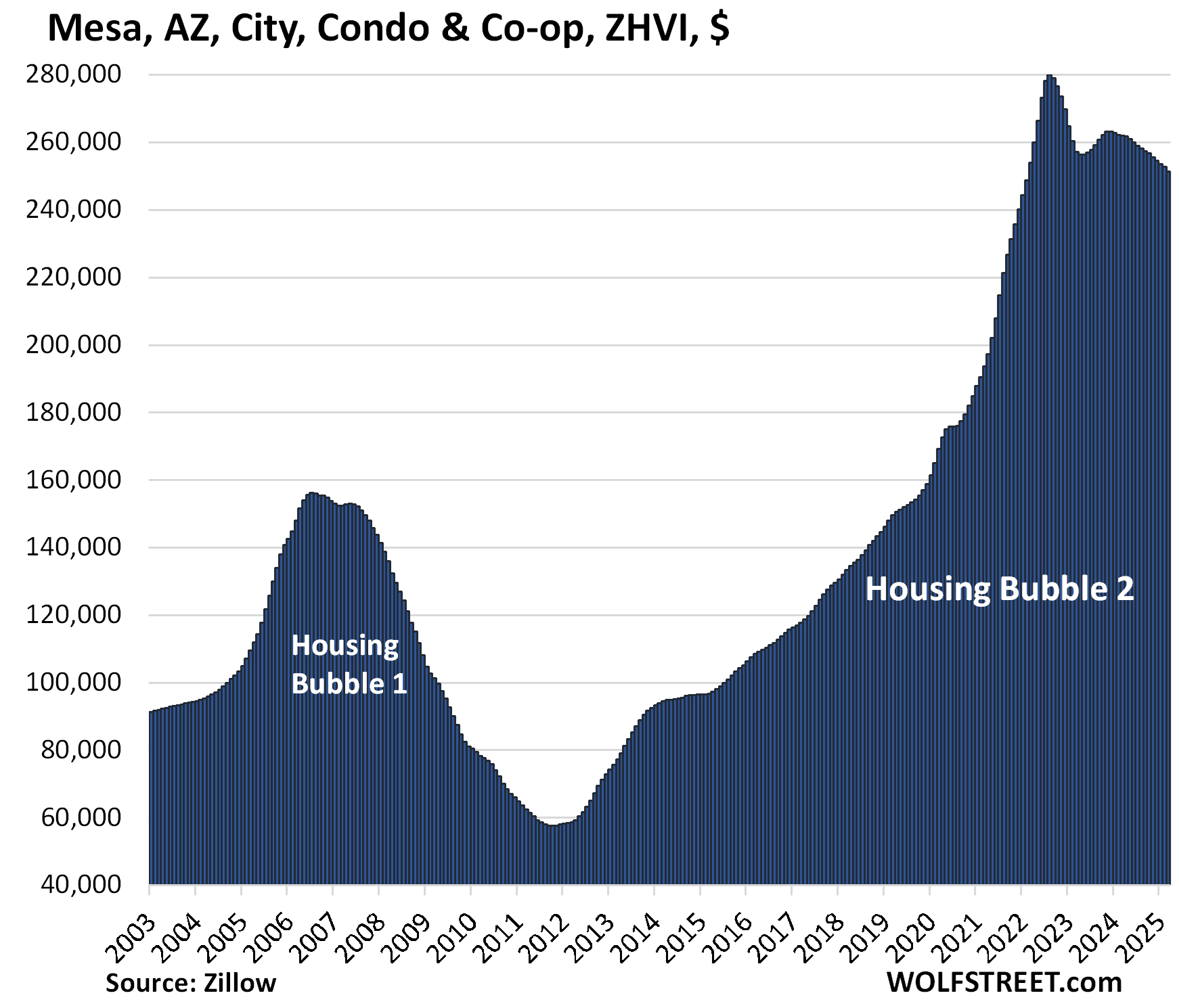
| Portland, City, Condo Prices | |||
| From Jun 2022 peak | MoM | YoY | Since 2000 |
| -10% | -0.4% | -3.0% | 117% |
Back to November 2016.
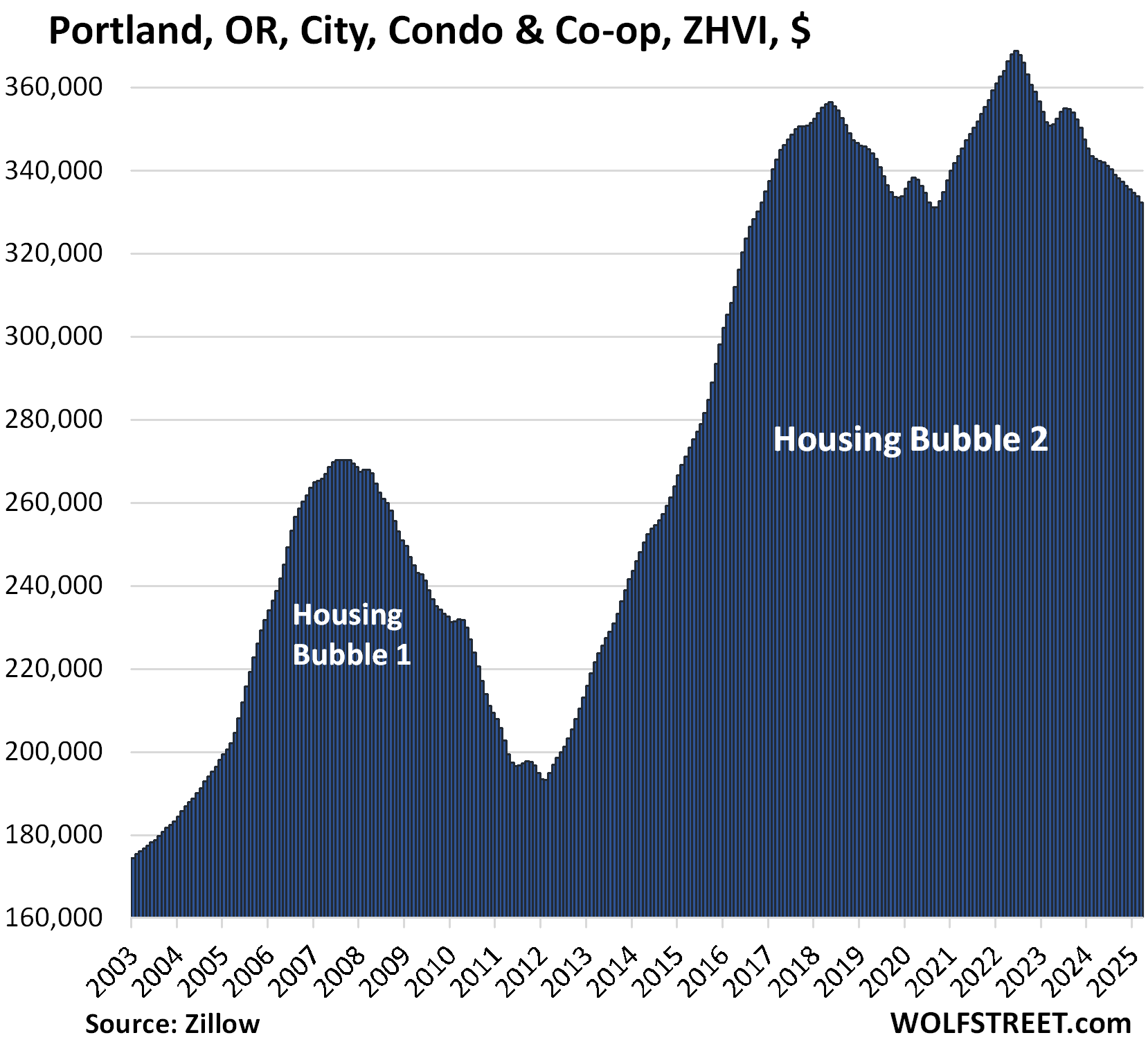
| Seattle, City Condo Prices | |||
| From Jun 2022 peak | MoM | YoY | Since 2000 |
| -10% | -0.4% | -1.7% | 147% |
Back to early 2018.
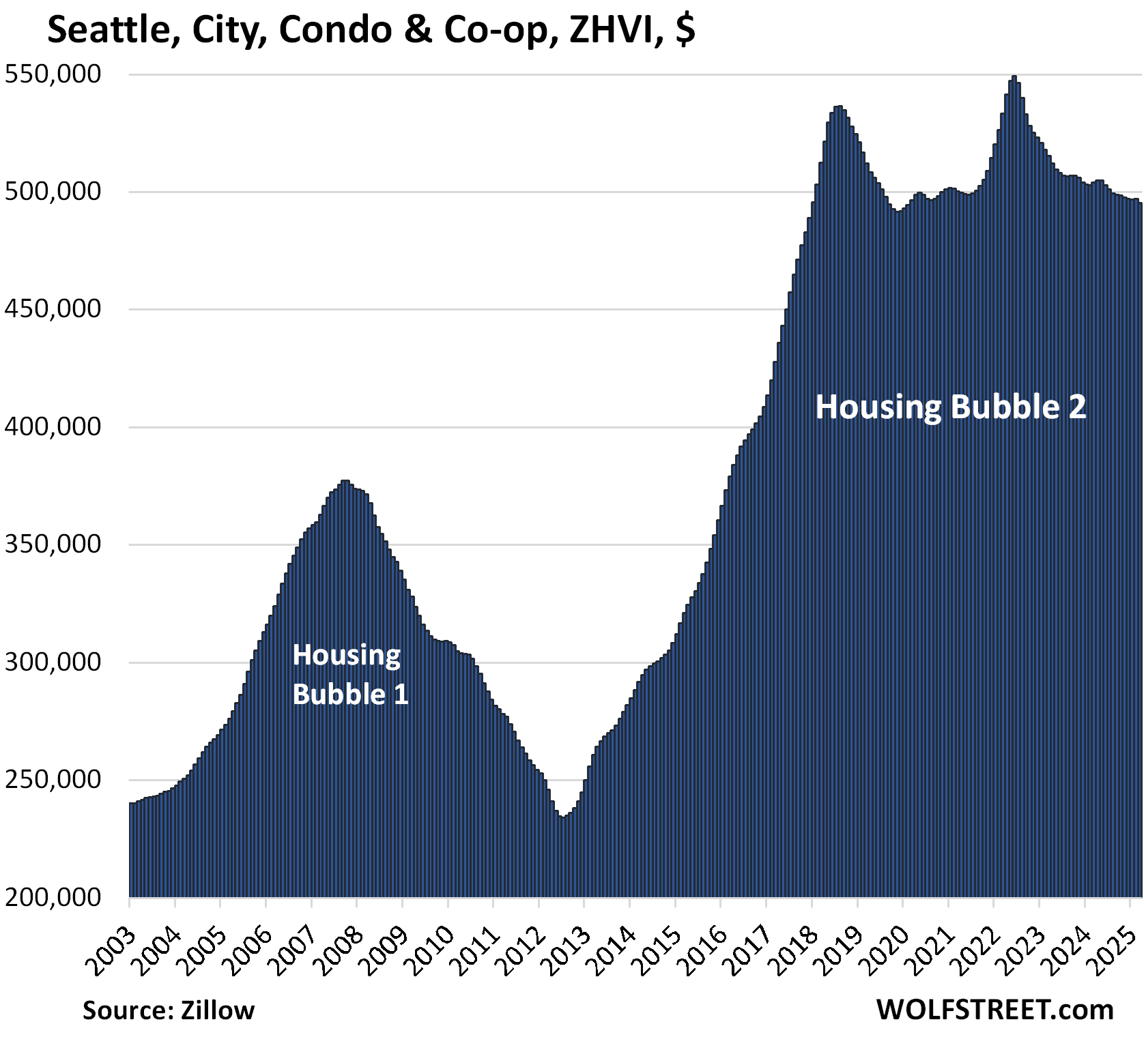
Enjoy reading WOLF STREET and want to support it? You can donate. I appreciate it immensely. Click on the mug to find out how:
![]()


Tesla revenue down 20 percent. Stock goes up 10 percent today (counting regular and after market hours). When does that absurdity come unglued?
Because Musk said he’ll return to his day job and run Tesla, and will step back from DOGE. And Tesla shareholders are believers in Musk.
Musk running DOGE was a bad deal for Tesla.
So how the heck is your comment related to condos?? Just because you’re pissed off??? You’re trying to hijack the comments!!
“And Tesla shareholders are believes in Musk” – You gotta give it to the power of a cult……the chosen messiah is back so better buy the dip now before stock back to the moon.
Americans do have short term memory, so this is probably not as far fetch and the cultist might be onto something if their messiah is back to working FT at Tesla..
Anyway, back on topic, crossing my fingers, hopefully one day will see Orange county and more cities in SoCal make this list..
Found the lunatic. +3 points
This comment is related to condos because I’m typing it from my condo. 😊
“Because Musk said he’ll return to his day job and run Tesla.” Let me add an ‘I’ – and RUIN Tesla.
Also, Wall Street has to pump up Tesla bcuz that’s what they specialize in –
Shi* sandwiches. It’s what they do best.
i think musk underestimated how entrenched the status quo of government spending is and how strong the forces for it, and thus against him, would be.
i underestimated just how entrenched the “prop up stocks at all costs” movement is, among the left and the right.
I did too. It is kinda crazy to be honest. Stocks topped out at an all time high and people are screaming at a 15% pullback. Sure the tariffs caused a lot of it but ffs. If you are about to retire then why are you in equities?
DM: Trump has ‘no intention of firing’ Fed chair Jerome Powell
Despite tearing into the Fed chair for days, President Trump told reporters he has ‘no intention’ of firing Jerome Powell. He still made another appeal for Powell to cut interest rates.
Setting the table for a scapegoat always make sense. Doesn’t have to be logical, just served up. Your average person might believe that not lowering interest rates is causing inflation. Not here of course.
From a WSJ story yesterday about FL condo market: “After months on the market, the unit received only one offer, at $30,000 below their asking price. He and his wife pulled $210,000 out of their retirement funds to pay for the new townhome, and held on to the condo as a rental.”
Hard to believe someone would sac $200k of their retirement to avoid a $30k undersell on the price they made up in their head.
Psychology and prices are a tough combo sometimes.
I wonder if by “out of their retirement funds” they mean taxable retirement accounts. Maybe not, maybe it’s other savings or a Roth IRA. If that’s not the case though, that’s a horribly tax inefficient move. Presumably they have other taxable income they live on. Assuming they are in only the 22% bracket, the taxes on $210,000 will be $46,200. Will they need to take more funds out of the taxable retirement accounts to pay those taxes, only to incur more taxes. It’s a spiral at that point which is why it’s best to never take large lump sums from a taxable retirement accounts without considering the tax implications. Retirements can be destroyed this way.
I think this is a pretty good example of hot hand fallacy and FOMO combined…when you believe housing can and only go up, and in some case double digit every year…all caution/risk averse thinking is throw into the wind…maybe in this case into the hurricane since it’s Florida
I was just reading an article (today) on the glut of condos on the Toronto market.
Toronto is legendary for its rapidfire production of condos to live in especially in the downtown core. A buyer’s market would hurt a lot of investors who plowed their money into this “sure thing.”
The sad thing about capitalism is that underprepared people with money to burn make investments they can’t back up with logic. Only the smart money profits in the end. That’s why fools love communism and socialism; it compensates for their foolish mistakes and natures.
The counterargument is that it’s very hard if not impossible to consistently outperform market averages. That’s the business model of Vanguard and passive investing, rather than thinking stock pickers can outperform.
From that perspective, market outcomes are unpredictable, some people win and some lose, and government can soften or “regulate” the losses in ways that make society better off.
Social security is the maybe the best example of a socialist program that solves an unpredictable market outcome: how long will your body be able to produce labor that commands a wage? That’s hard to know in advance, which makes it hard to use logic to invest in ways that provide for you after you cannot produce salable labor any longer.
Yes, the Toronto condo market is getting messy too:
https://wolfstreet.com/2025/04/15/the-most-splendid-housing-bubbles-in-canada-march-2024-sales-plunge-supply-surges-overall-prices-drop-to-multi-year-lows-driven-by-toronto/
DS,
That is the my most bizarre argument I have ever seen. But I guess China is a country of fools and have no chance of success. The concept that the government can exist to ensure the economy serves the needs of society is a most insane idea. Much better to maximize profit regardless of costs.
Thanks WR for this report.
Good to see Chula Vista, one of the city in San Diego County. So far, San Diego/So Cal, had been standing tall but this breaks that myth.
We have long way to go on this.
How do you plug holes in the Hoover Dam?
Silly putty? Super glue? Clay? Sticks and Stones?
Does it really matter? The dam is going to break. First it’s condos. That’s the smoke. Soon will come the fire. A five alarm fire. It may be on the scale of LA, but on a nationwide scale. ‘Firemen’ will be useless hood ornaments for this fire. Get ready folks, the upcoming housing fire willmleave many homeless.
Lol no it won’t.
There is a NY Times article today on the Florida condo market .
Ties in nicely with this post.
I can clearly see the accelerated declines . No shortage of housing anymore and now deportations high mtg rates and competition from new apartment rentals . Condos used to be the item that one could pic up bargains for actual living in them . I don’t like seeing deflation but the 2.5 trillion roll off has an effect for sure
I wonder what the market is doing for condos in Rockies. Hoa assessments have sky rocketed due to wild fire risk and values. People own 2nd or 3rd homes and their is a huge air BNB market.
I don’t see any of this asset value crunch as a bad thing if that means more housing for people who actually live in the area
My sister finally sold her furnished 2b2b condo in Volusia County Fl after a year of price reductions. She took it down from $495k to $375k when it sold. HOA is $850/mo. Fortunately she didn’t buy at the peak, just missed it like I did in late 2019.
I can see how at that price it’s a solid investment and I’m conservative. Property taxes are less than 1% plus HOA is a little over $1000/mo, in a huge complex that has never suffered hurricane damage. Yes eventually it will be underwater but so will I.
Like Wolf says, there’s always a buyer for the right price.
$850/month for HOA on a condo??? That’s $10,200 per year DOWN THE TOILET. Wow.
By solid investment I don’t mean I would invest. I’m a lifelong Californian and I thought my sister was nuts for moving to Florida, lovely as it is. I pay twice in property tax but my house isn’t going to be blown away and the worst weather I have is summer heat and 4 months of AC bills. It’s worth it to hang on by financial fingernails to stay in California, especially now.
“HOA is $850/mo.”
When house humpers tell you why renting is throwing money away…feel free to refer to this as money being thrown away just the same and worse of all instead of one landlord you have to deal with, you can get the joy of dealing with some characters on HOA that might mandate you to follow some absurd rules within the community. There’s also higher HOA than that in other areas and keep in mind HOA only goes up and never go down, even when and if the house go down in value
Another landlord is the property tax clowns. Another landlord, if you have not paid off your mortgage, is the bank you got your loan from. Another landlord is the insurance company crooks. And as you say, another landlord is the HOA. Another landlord is Mother Nature, who can destroy a flimsy house in a second with a tornado, flood, storm surge, tsunami, or hurricane (or how about a sinkhole), or those poor suckers in Florida whose condos have become structurally unsound because of corrosive salt from the ocean. She doesn’t require any direct payment, but you have to pay to protect your house or condo from her. I think I’d just as soon rent.
Being old and set in my ways real estate taxes come to mind. Here in my little village they have gone up every year for the last five. Southern Illinois isn’t the most expensive area but every increase adds to the fall.
Ground and house are paid but each year the county gets a ransom. I remember some retirees along the Gulf Coast being unable to afford their taxes. We also own a plot of country in that area. Hope I can hold on in both areas.
Property taxes are a scam
This is very welcome news and I hope the trend continues.
Amen. Inflated asset value are crushing the middle class. Homeownership is out of reach for so many people.
And the trade wars are reaching the RE markets. The tariff threat has paralyzed C. Powell’s rate cuts, as no one knows the scope, depth or details.
So, the very thing that P. Trump wants most is now blocked by his own policy. He’s done a great job lowering inflation, especially oil and rate cuts were looking palatable. Sadly, tariffs introduce new dynamics, such as increased prices and lower demand, that can affect employment and household spending.
As lower rates favor the real estate market, there are now bigger hurdles to jump depending on the tariff policies.
The trade wars are not reaching the RE markets. The RE markets imare its own inflated bubble from loose monetary policy